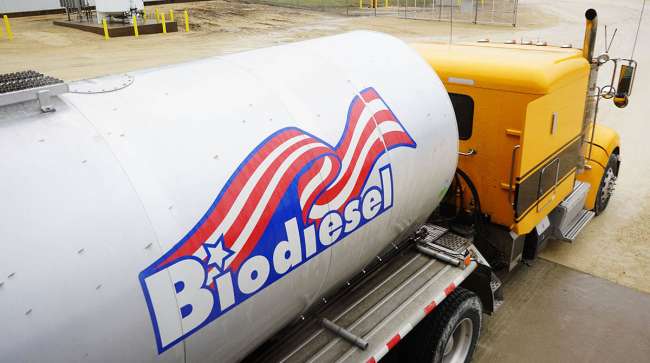Staff Reporter
CARB’s Biofuel Changes Raise Concern

[Stay on top of transportation news: Get TTNews in your inbox.]
Echoing concerns from farm belt senators about dubious Chinese used cooking oil ingredients in biofuels, American agriculture groups are decrying California’s planned 20% cap on U.S.-made canola- and soy-based biodiesel and renewable diesel that could tip the market toward foreign sources.
The California Air Resources Board on Aug. 13 announced proposed changes to biofuel feedstock requirements in its Low Carbon Fuel Standard. Seeking to cut fuel use by 94% within 21 years, CARB is considering limits for soy- and canola-based biodiesel and renewable diesel credits in favor of technologies such as electric vehicles.
The notice stated, “California expects that overall diesel demand will decline in the state over the coming decades due to the state’s portfolio of ZEV [electric vehicles] and clean fuel policies. The proposed addition also avoids sending a long-term signal for virgin soy or canola oil to serve California demand.”
CARB’s biofuel provision would take effect Jan. 1, 2028, to give feedstock providers time to adjust supply contracts.

“By capping canola- and soy-based biodiesel/renewable diesel, they [California officials] will need to electrify more of the diesel pool or use more imported feedstocks, such as used cooking oil (UCO) from China. There has already been a significant increase in UCO imports from China in the past year for renewable diesel production/demand in California,” Tom Hance, executive director of the U.S. Canola Association, told Transport Topics.
The nonprofit association’s members include canola farmers, processors, food manufacturers, exporters and seed companies. U.S. canola farmers already are investing to increase winter canola production, but CARB’s potential adoption of unfavorable biofuel regulations could derail this sector of the U.S. green fuel industry.

Hance
“It is harder to guarantee or be certain of the origin of UCO or other imported feedstocks, compared to biofuels produced in the U.S. For example, there is some speculation/concern that some of the flood of UCO imports in the past year could include palm oil (from Southeast Asia), which is not eligible for the California LCFS due to the environmental profile of its production and the concerns over deforestation,” Hance explained. “There is no deforestation in North America from canola and soybean production, and any ‘indirect’ impacts are already accounted for in the life-cycle analysis and carbon intensity scores developed for canola and soy biofuels.”
In late June, six U.S. senators sent a letter to four federal government leaders voicing alarm about potential harm to American biofuel producers from soaring imports of UCO with questionable biofuel ingredients by “foreign actors” possibly exploiting tax incentives.
“Since 2020, in response to demand for renewable fuels, the U.S. has gone from importing less than 200 million pounds of UCO per year to importing over 3 billion pounds in 2023, with more than 50% of these imports coming from China,” wrote Sens. Chuck Grassley and Joni Ernst (Iowa), Pete Ricketts and Deb Fischer (Nebraska), Roger Marshall (Kansas) and Sherrod Brown (Ohio). The only Democrat signing the letter was Brown.
It is critical that we protect American farmland from hostile foreign actors, but the current process is outdated and flawed.
I’m calling on @USDA to move away from a paper-based system and correct errors, so we can better protect our homeland! pic.twitter.com/kGcZiJM7CO — Joni Ernst (@SenJoniErnst) August 14, 2024
The letter went to top officials at the U.S. Department of Agriculture, Environmental Protection Agency, U.S. Trade Representative and Customs and Border Protection due to their shared responsibilities to ensure legitimate goods are imported into the U.S.
The senators told of large UCO imports that may be blended with undesirable palm oil directly linked to deforestation in Southeast Asia. They said that type of blended fuel is illegal and a “fraudulent value distortion” of a commodity designed to take advantage of U.S. tax incentives that also falls outside federal renewable fuel standards.
Cox Automotive's Kevin Clark discusses how dynamic parts management can transform your fleet services. Tune in above or by going to RoadSigns.ttnews.com.
“If true, this would have an especially punitive effect on U.S. agriculture, as imported UCO bears a lower carbon intensity score than domestically produced agricultural feedstocks, which incur punitive and unnecessary indirect land use change penalties in state and federal programs, as well as onerous verification and reporting requirements required of farmers to validate carbon-friendly practices,” noted the senators, who urged the other government officials to prevent such imports.
They said greater UCO demand has been linked to emission regulations in California, Oregon and Washington.
“While maintaining the integrity of feedstocks and renewable fuels should be of paramount importance to states with clean fuels policies,” the senators asserted, “it is even more vital that the federal government prevent counterfeit imported feedstocks from being incentivized by American tax dollars as such tax credits are implemented.”
California’s LCFS program requires transportation fuel producers and importers to lower through 2030 the carbon intensity of transportation fuels supplied or sold in California. Under the LCFS, producers and importers of regulated fuels (biomass-based diesel, natural gas, electricity and hydrogen) generate, acquire, transfer, bank, borrow and trade credits, according to the U.S. Department of Energy.
Want more news? Listen to today's daily briefing above or go here for more info
California’s proposed amendments “impose significant restrictions on vegetable oil feedstocks, hindering the ability of clean fuels to effectively decarbonize the heavy-duty transportation sector. Moreover, they introduce stricter standards for these fuels than those applied to others, including petroleum,” said Jeff Earl, state governmental affairs director at Clean Fuels Alliance America.
Grant Kimberley, Iowa Soybean Association market development senior director and Iowa Biodiesel Board executive director, said CARB’s move to impose biofuel caps without scientific justification could destabilize the economics of renewable fuels nationwide.
“This is not only a bad precedent for California, but bad for other states following California’s lead, and harmful to Iowa and other states with strong biodiesel production and a thriving farm economy,” Kimberley said. “Unlike petroleum, this proposal would penalize the many producers and farmers who have dedicated their livelihoods to a cleaner, more sustainable energy supply.”
Hance said the canola industry is “skeptical that the trucking industry and heavy-duty engines can be effectively electrified. Biodiesel and renewable diesel made from canola grown by U.S. farmers can meet the fuel needs of truckers and significantly reduce emissions. It is the best and most economical way to reduce fuel emissions.”
Higher fuel prices are another expected outcome of CARB’s proposed changes, noted an Aug. 27 letter to CARB officials from Natso and SIGMA. Together, the groups said they represent more than 80% of U.S. retail motor fuel sales.
In their letter, the groups stated that CARB’s carbon intensity reduction targets threaten to raise consumer prices for consumers. “Ambitious targets will inevitably increase the associated costs of compliance for fuel producers and distributors, and will ultimately be passed down to and borne by consumers in the form of higher fuel prices,” the groups said.





